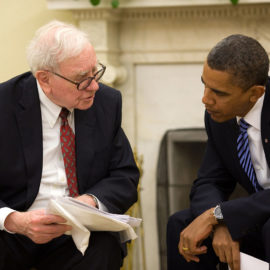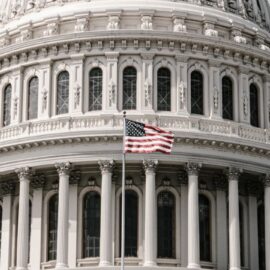

This article is an excerpt from the Shortform book guide to "Alexander Hamilton" by Ron Chernow. Shortform has the world's best summaries and analyses of books you should be reading.
Like this article? Sign up for a free trial here.
How did Alexander Hamilton become Secretary of the Treasury? What were the major changes he made during his time in the role?
According to Ron Chernow’s biography Alexander Hamilton, Secretary of the Treasury was one of the biggest roles to fill after the Constitution was ratified. President George Washington appointed Hamilton as the first person to fulfill this duty and changed the course of the US economy.
Find out how Hamilton changed the US economy by imposing new taxes, which led to criticisms from other politicians.
Hamilton as Treasury Secretary
After the Constitution was ratified by a majority of the states, politicians began formally organizing the government, and in 1789 Washington was elected the first president of the US. Chernow argues that Washington was the only possible choice for the job by the turbulent 1780s, since he commanded near-universal respect after leading the Revolutionary Army to victory.
Washington appointed a cabinet of ministers to assist him in decision-making, including Alexander Hamilton as Secretary of the Treasury. This was the highest office Hamilton would ever hold, and Chernow claims that Hamilton left a permanent mark on the US economy, driving it toward capitalism, industrialization, and trade.
Imposing New Taxes
As Secretary of the Treasury, Alexander Hamilton worked to establish the US banking system and impose federal taxes on trade. In a series of reports to Congress, he advised selling government bonds to help finance its operations for the next few years, printing paper money that could replace gold and silver as acceptable tax payments, consolidating individual state debts into a single national debt that Congress would have the responsibility of paying off, imposing taxes on foreign luxury goods like alcohol, tea, and coffee, and establishing the Coast Guard to prevent smuggling and ensure collection of customs duties. All of these policies were eventually adopted.
(Shortform note: These policies—having government bonds available for sale, using paper money, taxing imports—have all survived and even been expanded in the modern-day US. The Coast Guard has also grown, from fewer than a hundred initial members in 1790 to nearly 45,000 today. It is both a military and federal regulatory agency, whose duties outside of tax collection and anti-smuggling operations include search and rescue, enforcing fishing laws, collecting data for the National Weather Service, and operating as a branch of the US Navy during wartime.)
Chernow notes that Hamilton’s economic policies were often controversial, particularly his tax policies. Any tax was unpopular, since the heavy taxes imposed by Britain had been a driving force behind the revolution. Hamilton’s suggestion that domestic production of distilled spirits like whiskey be taxed led to the Whiskey Rebellion of 1794, in which protestors attacked tax collectors. Washington had to personally ride out with over 10,000 militiamen to quell the uprising. Even so, Chernow credits Hamilton’s policies with saving the young US from bankruptcy; by 1790, 90% of government income came from the import taxes he’d proposed.
(Shortform note: Taxes have remained unpopular throughout US history, though most of the taxes modern Americans are familiar with—such as the income tax, sales tax, or taxes designed to fund Social Security—originated in the early 20th century, long after the Founding period. People have differing reasons for resisting taxes; while some argue that taxes are theft by the government, others use tax resistance as a form of conscientious objection or oppose taxes that they feel unjustly target certain groups.)
Growing Resistance to Hamilton
Hamilton’s economic policies were often criticized by southern politicians like Secretary of State Thomas Jefferson and Hamilton’s former ally Madison, who broke with Hamilton over his debt reduction plan. They felt that Hamilton was gutting the rights of states by placing more and more regulatory power in the hands of the government, and in the Office of the Treasury in particular. They waged a particularly vicious attack on the Federal Reserve, arguing that the government had no right to establish credit and regulate commerce so directly. Hamilton retorted that the Constitution, by mentioning the federal government’s right to collect taxes and regulate trade between the states, gave his office “implied powers” over the economy.
(Shortform note: The doctrine of implied powers has been questioned repeatedly throughout US history, as critics argue that it violates both the spirit of the Constitution and the text of the Tenth Amendment. However, it would eventually be held up by the Supreme Court, the government body which has the power to dismiss laws based on whether or not they violate the Constitution. In McCulloch v. Maryland (1819), the Court ruled that “implied powers” was a fair defense of the Federal Reserve, since the Constitution declares that the federal government should have as much power as is “necessary and proper” to carry out its duties.)
Chernow suggests that Jefferson’s criticisms of Hamilton were partly motivated by resentment. Washington went to Hamilton for suggestions far more often than he went to Jefferson or even Vice President John Adams, who worked primarily in the Senate. Throughout Hamilton’s career, critics would accuse him of being a closet authoritarian who manipulated Washington into passing undemocratic policies. However, Chernow points out that records of cabinet meetings show that Washington was unafraid to disagree with or override Hamilton’s suggestions.
(Shortform note: These accusations are an example of the political trope of the manipulative advisor or “power behind the throne,” who is accused of using their personal relationship with a ruler to advance their own interests. While some genuine historical examples exist, people often invoke this trope so they can criticize their government without directly attacking the ruler, instead scapegoating another, less important figure. The American revolutionaries used this rhetorical sleight-of-hand themselves in their 1774 Petition to the King, in which Congress claimed it was still loyal to King George III and merely resisted the unjust policies of Parliament.)

———End of Preview———
Like what you just read? Read the rest of the world's best book summary and analysis of Ron Chernow's "Alexander Hamilton" at Shortform.
Here's what you'll find in our full Alexander Hamilton summary:
- The biography of Alexander Hamilton that was adapted into the Broadway musical
- The life and influence of the overlooked Founding Father
- How Hamilton's life ended in scandal and a fatal duel






